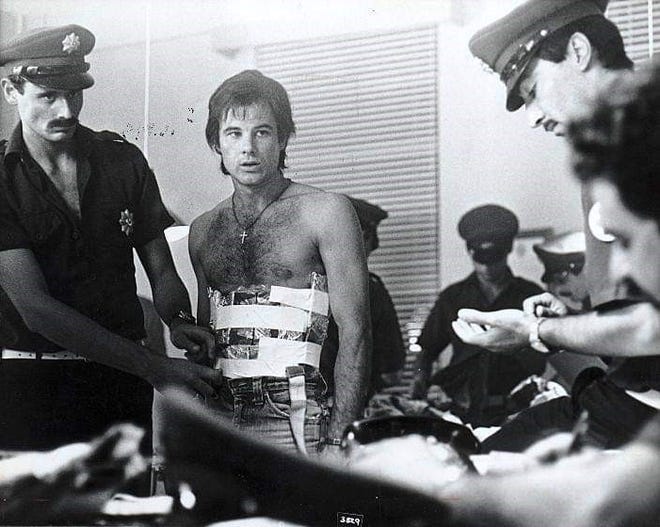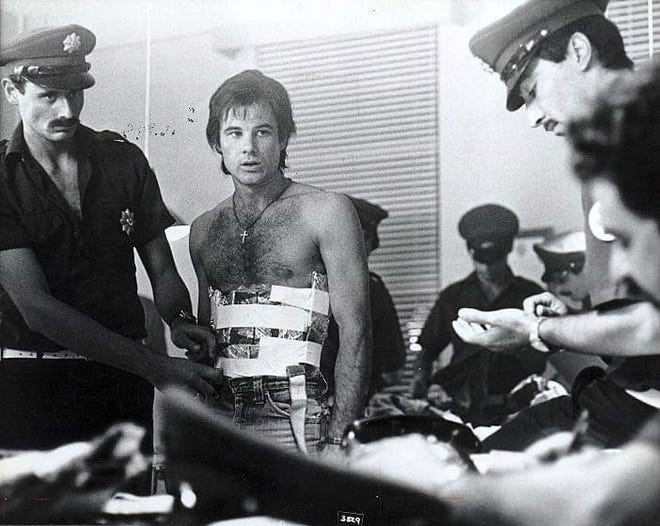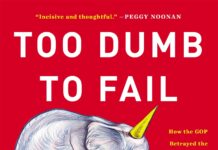
Brad Davis’ refrigerator groaned in the dark.
The motor kicked into high gear during the night. Dolphin-pitched whirrs occurred. Then came the clanks. Followed by trembles. I think it may have been possessed.
The rounded, ancient ice box moved into my kitchen in the early 1990s, not long after Davis died. Allow me to shine some light on the actor and the fridge’s origins.
Composer dies:Tallahassee’s world-famous opera composer, Carlisle Floyd, dies at 95
Venues and theaters:Tallahassee venues and theaters receive federal aid, but their future remains uncertain
My father and I watched “Midnight Express” (1978) when it finally came to Marianna. It was a prison movie that starred newcomer Davis, who grew up in Tallahassee, and was directed by Alan Parker, who went to meet his maker in 2020.
In “Midnight Express,” Davis played an American tourist caught with hashish at the airport. He was sentenced to 30 years in a hellish Turkish prison. The new guy got to know elder inmate John Hurt, who coughed and hacked a lot. Oh yeah, Davis killed a rapist guard after he shoved the attacker into a coat hook.
I found the film harrowing, as I crossed Turkey off my travel itinerary.
My father, a World War II frogman who used to swim up on hostile beaches in Japan and punch curious sharks on the nose, seemed less impressed.
“So, what did you think?” I asked in the parking lot.
“He was a bad smuggler,” my father shrugged as he fired up a Kool cigarette. “He gave it all away. No wonder he got caught.”
Everyone is a film critic.
Davis struggled after initial fame
Parker went on to make such box-office hits as “Angel Heart” (1987), which caused then-beloved comic Bill Cosby to spit out his Jell-O pudding when he saw Lisa Bonet’s chicken dance, and “Mississippi Burning” (1988), where the FBI led the Civil Rights Movement in Mississippi (insert eye-roll here).
Davis became the “It Boy” after “Midnight Express.” The movie won Best Drama at the Golden Globes, where Davis was named New Star of the Year. The picture got nominated for an Academy Award and John Hurt got a tip of the Oscar hat, too.
As follow-ups, the dark-haired, handsome Davis played writer Philip Caputo in the adaptation of the Vietnam drama “A Rumor of War” (1980) and American athlete Jackson Scholz in “Chariots of Fire” (1981), one of the most boring sports films ever made. “Chariots of Fire” won the Oscar for Best Picture, naturally.
But the Big Time never came calling for Davis, who appeared ready for his close-up with stardom.
Behind the scenes, there were tales of the young movie actor’s dope habit and booze struggles. During one Hollywood party, Brad Davis allegedly ripped off his shirt and bellowed, “OK, who’s got the drugs?”
“There goes that career,” one director at the party allegedly muttered.
Drugs, AIDS and Hollywood
His bisexuality was also no secret. Davis sought out gay subject matter in his work, a rarity for actors of the day. He starred as a sailor-murderer in director Rainer Werner Fassbinder’s art-house bomb “Querelle” (1982). Fassbinder died of a drug overdose shortly before the film hit theaters and the Jean Cocteau adaptation sank from sight in Ronald Reagan’s America. “Querelle” has since been reappraised and proved ahead of its time.
In 1985, Davis took to the stage in “The Normal Heart” by playwright-activist Larry Kramer, who also died in 2020. The play about the AIDS crisis happened at the height of the AIDS crisis. That was the same year Davis learned he was HIV-positive.
From that point on, Hollywood jobs shunned Davis. In a town that supposedly supports gay rights and hosted AIDS fundraisers, hypocrisy kept winning. Davis died from assisted suicide on Sept. 8, 1991.
“At his core, he was still a small-town Tallahassee boy,” Larry Kramer said when I talked to him on the phone several years ago. “There were just too many temptations in the big world.”
He really did give it all away.
Time in Tallahassee
Davis grew up in North Florida during the Baby Boomer-groomed ‘50s with one younger brother. To the outside world, the dentist dad, Dr. Eugene Davis, and mother, Anne Creel Davis, led a perfect “Live It to Beaver” existence.
The parents were called Doodle and Annie. Doodle’s poker buddies included the chief of police. During the young kid’s early days at Kate Sullivan Elementary School, he dreamed of being an actor. The future looked bright.
The family harbored dark secrets, too, according to one close observer.
“Brad’s family were an enigma to me – characters in a Faulkner novel, mad Gothic Southerners playing roles in black tales of alcoholism and incest and suicide attempts,” wife Susan Bluestein Davis writes in the memoir, “After Midnight: The Life and Death of Brad Davis.” “It would be funny if it were not so tragic.”
That’s the gnarled, twisted world I stepped into with my landlady after Doodle died in the early ‘90s, not long after his famous son died. The landlady read about the 1960s fridge in the newspaper ad for an estate sale. We took a pick-up truck to a ranch house in east Tallahassee. Then I walked inside of Doodle’s private Twilight Zone.
I have no idea what Doodle’s final days were like, but they could not have been happy ones. The rooms smelled like unemptied ashtrays. There were cigarette marks and old filters scattered on the shag carpet in the living room. Burns scarred the end tables in front of an old TV set. The floor around the bed in the master suite was singed from lit cigarettes. How Doodle did not burn to death, I will never know.
Secrets of the ice box
The sparse furnishings were what I would call Unintentional Minimalist. Trash cans were filled with empty liquor bottles. The air felt haunted.
“He went downhill after Brad died,” my landlady told me in a hushed voice.
After wheeling the vintage fridge out on a dolly and loading it in the bed of the truck, my landlady filled me in about the family’s Civil War connections. Jefferson Davis, the president of Confederate States of America, allegedly counted as direct kin. The blood-stained ghost of the racist South followed the actor.
Back at my house, four doors down from Davis’s old elementary school, I plugged in the old refrigerator. The motor wheezed and sputtered to life. The noisy box had a few rust stains and the white color had faded to beige, but it served its purpose. It kept everything cool.
Still, late at night, it would clunk and shiver and emit unholy sounds, as if it knew something I did not. As if had witnessed things best not talked about. And it was not about to give away its secrets.
Mark Hinson is a former columnist and senior writer at The Tallahassee Democrat. He can be reached at mark.hinson59@gmail.com.
Never miss a story: Subscribe to the Tallahassee Democrat using the link at the top of the page.








